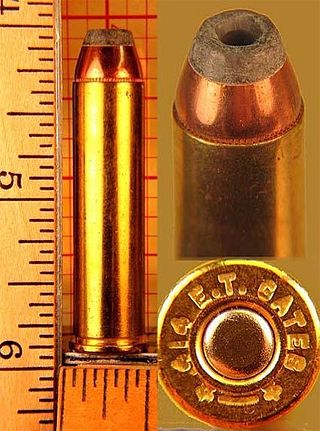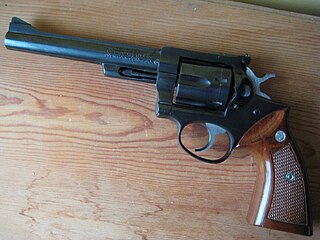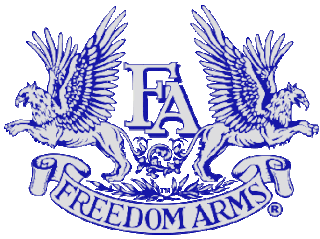
The Colt Single Action Army is a single-action revolver handgun. It was designed for the U.S. government service revolver trials of 1872 by Colt's Patent Firearms Manufacturing Company and was adopted as the standard-issued pistol of the U.S. Army from 1873 until 1892.

The .45 Colt (11.43×33mmR), is a rimmed, straight-walled, handgun cartridge dating to 1872. It was originally a black-powder revolver round developed for the Colt Single Action Army revolver. This cartridge was adopted by the U.S. Army in 1873 and served as an official US military handgun cartridge for 19 years, before being replaced by the .38 Long Colt in 1892.

The Colt Anaconda is a large frame double-action revolver featuring a full length under-barrel ejection-rod lug and six round cylinder, designed and produced by the Colt's Manufacturing Company in 1990. Chambered for the powerful .44 Magnum and .45 Colt centerfire ammunition cartridges, the Anaconda marked the Hartford, Connecticut firm's first foray into the popular large-bore Magnum pistol market.

The .44 Remington Magnum, also known as .44 Magnum or 10.9x33mmR, is a rimmed, large-bore cartridge originally designed for revolvers and quickly adopted for carbines and rifles. Despite the ".44" designation, guns chambered for the .44 Magnum round, its parent case, the .44 Special, and its parent case, the .44 Russian all use 0.429 in (10.9 mm) diameter bullets. The .44 Magnum is based on the .44 Special case but lengthened and loaded to higher pressures for greater velocity and energy.
The .480 Ruger (12.1×33mmR) is a large, high-power revolver cartridge, introduced in 2003 by Ruger and Hornady. It was the first new cartridge introduced by Ruger, and when introduced, was the largest-diameter production revolver cartridge, at .475 in (12.1 mm).

The Raging Bull is a revolver manufactured by the Brazilian Taurus International firearm company.

A moon clip is a ring-shaped or star-shaped piece of metal designed to hold multiple cartridges together as a unit, for simultaneous insertion and extraction from a revolver cylinder. Moon clips may either hold an entire cylinder's worth of cartridges together, half a cylinder, or just two neighboring cartridges. The two-cartridge moon clips can be used for those revolvers that have an odd number of loading chambers such as five or seven and also for those revolvers that allow a shooter to mix both rimless and rimmed types of cartridges in one loading of the same cylinder.

In American English, a pocket pistol is any small, pocket-sized semi-automatic pistol, and is suitable for concealed carry in a pocket or similar space.

The Ruger Blackhawk is a six-shot, single-action revolver manufactured by Sturm, Ruger & Co. It is produced in a variety of finishes, calibers, and barrel lengths.

The GP100 is a family/line of double action five-, six-, seven-, or ten-shot revolvers made by Sturm, Ruger & Co., manufactured in the United States. Since its introduction, it has been produced with a number of variations including various barrel lengths and profiles, fixed or adjustable sights, and in blued carbon steel or stainless steel.

The Super Redhawk is a line of double-action magnum revolvers made by Sturm, Ruger beginning in 1987, when Ruger started making weapons using larger, more powerful cartridges such as .44 Magnum, .454 Casull, and .480 Ruger.

A snubnosed revolver is a small, medium, or large frame revolver with a short barrel, generally less than 4 inches in length. Smaller such revolvers are often made with "bobbed" or "shrouded" hammers and there are also "hammerless" models ; the point is to allow the gun to be drawn with little risk of it snagging on clothing. Since the external movement of the mechanism is minimal or nil, shrouded and hammerless models may be fired from within clothing. The design of these revolvers compromises range and accuracy at a distance in favor of maneuverability and ease of carry and concealment.

The Ruger Single-Six is a single-action rimfire revolver produced by Sturm, Ruger & Co. The Single-Six was first released in June 1953.

A super magnum is a longer and/or more powerful version of a "magnum" cartridge. Although the term "super magnum" typically refers to a handgun cartridge, created by lengthening an existing straight-case design, it can also refer to rifle and shotgun cartridges, such as the .17 Winchester Super Magnum and the 31⁄2" 12 Gauge Super Magnum. In this case, it simply denotes that it is of greater power than existing "magnums" of a similar caliber or gauge, this is comparable to other designations, such as the "Remington Ultra Magnum". The most widespread of these cartridges are the "SuperMag" family of super-magnum handgun cartridges that were proposed and tested by Elgin Gates in the 1970s.

The Ruger Vaquero is a six-shot single-action revolver manufactured by Sturm, Ruger & Co. based on the New Model Ruger Blackhawk frame and was introduced in 1993. It comes in blued steel, case colored, and a gloss stainless finish, all of which are available with wood, hard rubber, simulated ivory or black micarta grips and fixed sights. It arose with the popularity of Cowboy Action Shooting from which came demand for a single-action revolver that was more traditional in appearance.

The Colt New Service is a large frame, large caliber, double-action revolver made by Colt from 1898 until 1941. Made in various calibers, the .45 Colt version with a 5½" barrel, was adopted by the U.S. Armed Forces as the Model 1909.

The Ruger Security-Six and its variants, the Service-Six and Speed-Six are a product line of double-action revolvers introduced in 1972 and manufactured until 1988 by Sturm, Ruger & Co. These revolvers were marketed to law enforcement duty issue, military, and civilian self-defense markets.

Freedom Arms is a Freedom, Wyoming based firearm manufacturing company, known for producing powerful single-action revolvers. The company was founded in 1978 by Wayne Baker and Dick Casull to produce the Mini-Revolver, then later a revolver chambered in Casull's powerful .454 Casull revolver cartridge. This 5-shot revolver was the Model 83. Freedom Arms currently makes a single-shot pistol in addition to their revolvers.

Remington Model 1875 Single Action Army was a revolver by E. Remington & Sons. It was based upon the successful New Model Army with both revolvers having the same size, appearance, and the removable cylinder. The new 1875 Remington differed mainly from the older 1858 percussion model by having a bored through cylinder chambered for metallic cartridges. Thus, in 1875, Remington entered the cartridge revolver market with this big-frame, army style revolver, intended to compete with the Colt Peacemaker. Ordinary citizens and Old West lawmen alike recognized the sturdy quality of the new Remington revolvers. This design was followed by the Model 1888 and the Model 1890.

Richard J. Casull was a Salt Lake City-born gunsmith and wildcat cartridge developer whose experiments with .45 Colt ammunition in the 1950s led to the creation of the .454 Casull cartridge. Casull's passion was six-shooters, and he was determined to create a high velocity round for the .45 Colt. His goal was to achieve a muzzle velocity of 2,000 feet per second with Colt .45 rounds fired from a single-action Army-style revolver with a 7+1⁄2inch barrel. This proved impossible due to the tensile strength of the Colt .45 cylinder, so he set out to develop his own casing and bullet.





















